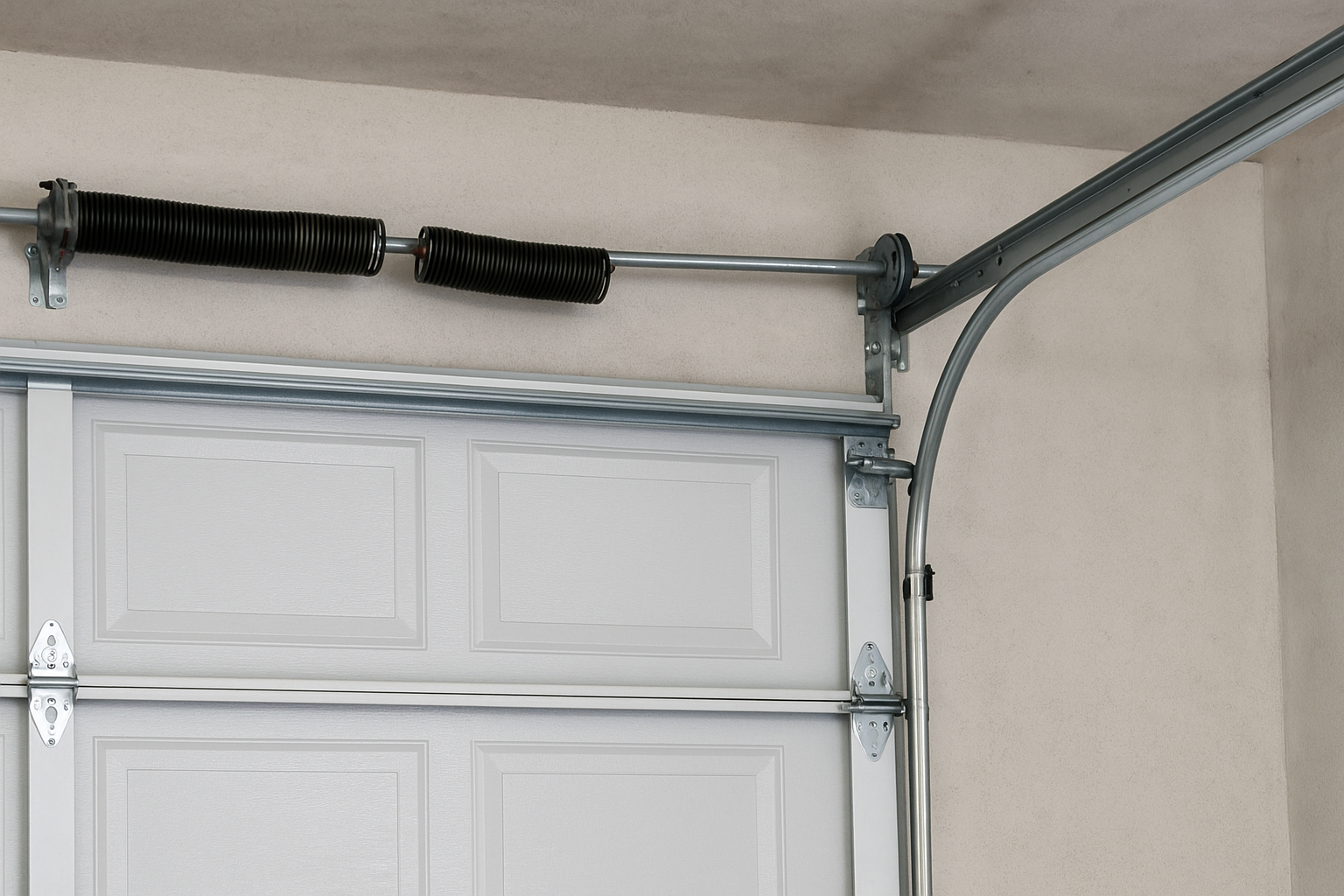Your garage door keeps your home safe. It shields your family and your belongings. It also makes daily life simple. You press a button, and it opens without effort. A working door saves you time and stress.
A broken door does the opposite. It stops you from leaving on time. It forces you to park outside. Bad weather, thieves, or pests can then get to your car or tools. Small problems often hide. They seem minor at first. A tiny gap or slow movement might not worry you.
Ignoring these signs causes more damage later. A snapped spring makes the door heavy and unsafe. A track that slips out of line can jam the door. These repairs then cost much more. You might even face an emergency fix.
This guide shows you what goes wrong with garage doors. You will learn why each problem matters. You will also see how to keep your door in good shape. A little care today keeps you from paying big bills tomorrow.
Why You Should Fix Garage Door Problems Soon
Garage doors carry heavy weight. They work under strong tension each time you open or close them. This puts stress on every part. A small issue does not stay small. It grows fast.
A track that moves just a little can throw the door off balance. Then the door could come off the rails. A spring that weakens might snap. This often damages other parts. You could end up with a door that will not open at all.
Fixing these problems early costs much less. It also keeps your family safe. A broken door can fall without warning. It could hurt someone or crush something below.
Fast repairs protect your wallet. They also give you peace of mind. A door that works well makes your whole home safer.
Broken Springs: The Most Common Trouble
Springs do most of the lifting. They take the heavy weight of your garage door and make it easy to open. A good spring balances the door so even a child can raise it.
A broken spring changes everything. The door becomes heavy and awkward. You might not lift it at all. The opener also strains. It tries to pull the full weight without help. Many openers grind or stop working completely when the spring fails.
Broken springs are the top reason garage doors fail. They wear out after years of use. They also face more stress in cold weather. If your door feels heavy or your opener sounds rough, you likely have a bad spring.
Fix this right away. You save the opener and keep the rest of the door from breaking too.
Why Springs Snap
Springs do heavy work each time your door moves. They stretch and pull to lift the door’s weight. This puts stress on the metal. Over time tiny crack start to form.
Most spring last about 10,000 cycle. That means opening and closing the door around 10,000 time. For many families, this equals 7 to 10 years. After that, the metal weakens.
Old springs snap without warning. Cold weather also makes metal more brittle. Rust speeds up damage too. A snapped spring means your door could drop or jam.
Watch your springs closely. If you see gaps, rust, or stretched coils, call a pro. Replacing them early keeps your door safe and smooth.
How to Spot a Broken Spring
-
The door feels heavy.
-
It hangs crooked.
-
The opener makes odd noises.
Why You Should Hire a Pro
Garage door springs hold a lot of force. They carry heavy tension so your door lifts with ease. A wrong move can snap the spring. It could whip back and cause serious harm.
Fixing springs yourself is risky. Many people try to save money and end up in the hospital. A trained technician knows how to handle these repairs safely. They have the right tools and skills.
Local experts also care about their work. In Wisconsin, techs rely on happy customers to build a strong name. They want you safe. They also want you to call them again if more problems show up later.
Trust a pro to fix your springs. You stay safe. Your door works right. You also get peace of mind knowing the job was done correctly.
Misaligned Tracks: A Big Hidden Risk
Tracks keep your garage door moving straight. They guide the door up and down each time you use it. Tracks that shift out of place cause real problems.
A small bump from your car or a heavy object knocks tracks out of line. Loose screws also let them slip over time. Then your door struggles to stay on course. It might jam halfway or stop completely.
You could hear loud scraping or grinding. The door may look crooked when closed. This puts stress on your opener. It also wears out rollers faster.
Bad tracks lead to bigger costs. They can even make the door jump off the rails. Check your tracks often. Look for gaps, bends, or loose bolts. Fix small shifts right away. You keep your door safe and save money in the long run.
What Shifts Tracks
-
A car or heavy item might bump them.
-
Screws may loosen over time.
-
Years of use cause small shifts.
Signs Tracks Are Out of Line
-
The door scrapes or squeals.
-
It sits uneven on the floor.
-
You see gaps or bends.
-
The door jerks or stops.
Why a Pro Matters Here Too
Sometimes you only need to tighten bolts or clear dirt. Bad bends or broken metal need an expert. A pro realigns or swaps out tracks so your door glides again.
Worn Rollers: A Tiny Part That Causes Big Trouble
Rollers guide your garage door along the tracks. They keep the door smooth and steady. These small part do a big job. Each time you open or close the door the roller carry weight and handle friction.
Roller wear down after year of use. Cracks or flat spots start to form. Bad rollers slow the door. They make it shake or jerk. The door may also start to lean or drag on one side.
Worn rollers stress other parts too. The opener works harder to pull the door. Springs and tracks take more force than they should. This often leads to bigger failures.
Watch your rollers. Listen for scraping or grinding sound. Check for crack or sign of wear. Replace bad rollers early. You avoid bigger costs later and keep the door moving like it should.
What Shows Rollers Are Bad
-
The door drags or jerks.
-
You hear loud squeals or grinding.
-
Rollers look cracked or misshaped.
How to Pick New Rollers
Rollers come in steel or nylon. Nylon runs quiet. Steel lasts longer. A technician can help you choose. Replacing roller without the right tool or know how is risky. A pro does it right.
Opener Trouble: Another Common Headache
The opener lifts and drops your garage door. A bad motor or faulty wires stop the door cold.
What Could Go Wrong
-
The door won’t budge. This could mean a dead motor or power issue.
-
It opens but refuses to close. Bad sensors or springs often cause this.
-
It starts then stops. The limit switch or remote might fail.
Why You Need Expert Repairs
Changing a battery or remote is simple. Motors or sensors call for a skilled tech. A pro checks every part and solves the real problem.
Simple Checks Help You Avoid Big Costs
Small checks catch problems before they grow. You protect your door and your wallet.
Easy Steps You Can Do
-
Spray silicone on springs, rollers, and tracks.
-
Tighten loose screws.
-
Look at springs for rust or breaks.
-
Test door balance. Pull the release cord and lift. It should stay halfway. If it falls, the springs need help.
Times You Must Call a Pro
You can handle small checks yourself. Some repairs call for a pro. Get expert help if you see:
-
Snapped or stretched springs.
-
Bent or damaged tracks.
-
Openers that fail.
-
Doors that drop instead of staying in place.
A pro keeps you safe. They also make sure the door lasts longer.
A Healthy Garage Door Saves You Stress and Cash
A garage door that works well protects more than your car. It keeps your family safe. It also guards your tools and valuables. You avoid stress each day when the door opens without problems.
Trouble starts small. A tiny crack in a spring or a track slightly out of line may not look serious. Then these issues grow. You could face a stuck door or a panel that falls without warning. This turns into a big expense fast.
Fix small problems right away. A quick fix today stops a disaster tomorrow. It also saves you from paying for a brand-new door.
Pay attention to how your door sounds and moves. Grinding, squealing, or jerking signals trouble. A slow door often means a part is close to failing. Call a local expert as soon as you notice something off.
A little care now protects your wallet later. Your door will last longer and work better. You also keep your family and home secure.




